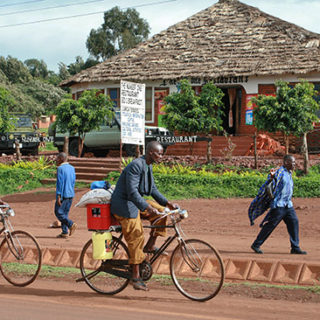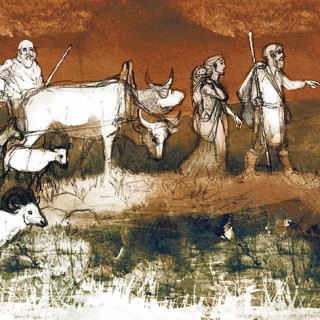“There is no simple link between climate change and migration”
The last few years several newspapers have claimed that climate change will lead to “millions of climate refugees”. But according to Angela Oels, migration in fact isn’t caused only by a single factor: “For us, from the social sciences. It is very important to highlight that there is no simple link between climate change and migration”, says Angela Oels. Instead, the relationship is “multi-causal” involving many political factors.
Angela Oels analyses some of the misconceptions surrounding climate change and migration. She has been a visiting professor at the Lund University Centre for Sustainable Development with a scholarship from Riksbankens Jubileumsfond. You find her today at Open Universiteit Nederland.
ANGELA OELS ARGUES that poverty is a key factor that makes people more vulnerable to climate change impacts in the first place. It is only when the government is not able to or fails to take action that a natural disaster will turn into a humanitarian disaster.
For the case of Syria, it has been argued that the severe drought from 2007 to 2010 “caused” the displacement of 1.5 million people. However, according to Angela Oels, it was not the drought itself but the failing policy that made the migration necessary.
“People were only vulnerable to drought because the ground water had been overused for years” says Angela Oels. And, when the drought hit, there was too little support from the government that the resulting tensions led to a civil war and were due to political factors, not due to the climate. “Calling Syrians climate refugees is misleading as it distracts and covers up the political failures, in this case those of the Assad regime”, says Angela.
AS A POLITICAL SCIENTIST, Angela Oels studies how the framing of an issue influences global political decisions. Angela and her colleague, Chris Methmann have analysed international policy documents from the last 30 years in a discourse analysis. They found three different discourses that problematize climate change and migration in different ways. They find all three discourses problematic, but for different reasons.
The first discourse constructs climate refugees as a threat to national security.
“We are warned that millions of climate refugees will flood the industrialised countries”, says Angela. She argues that this discourse is xenophobic and mobilises border controls more than anything else.
The second discourse appeals to us to help climate migrants by offering them refugee status. At the moment, only those fleeing political prosecution are eligible for refugee status under the Geneva Refugee Convention (1951). What’s problematic about this discourse is that people in the South are reduced to passive victims who don’t have any say in this.
“When you ask affected people for example from small island state, they are in fact not interested in refugee status. They want to stay where they are and they call for radical emission reductions”, says Angela.
The third discourse argues that migration has always been one of the ways in which people have adapted to a changing climate.
“So climate migration is no longer a scandal to be avoided. In fact it is now a solution to a changing climate”, says Angela.
“Calling Syrians climate refugees is misleading.”
THE TERM ”CLIMATE REFUGEE” is now off the table – affected populations are now discussed under the label of “climate change induced migrants”. According to the UK Foresight Report (2011), climate migration is a rational and legitimate strategy of adaptation to climate change. While this is true, Angela argues that this discourse is problematic too, because it naturalises the losses affected people suffer.
”It is definitely a scandal for them because they lose their livelihoods and their existence”
What is most problematic about the recent climate migration discourse is that it starts from the false assumption that massive climate migration is inevitable.
“In fact, a lot of the projected migration can still be avoided if poverty is reduced and if drastic emission reductions are implemented”, says Angela Oels. Changing structural conditions so that they reduce poverty and inequality in the world is therefore one of the most effective strategies to protect people.
“Climate Migration is part of a broader resilience discourse”, says Angela. Resilience is the ability of a social or ecological system to absorb a shock, survive and bounce back from it. This is currently a popular concept, particularly in adaptation to climate change.
ACCORDING TO ANGELA, resilience thinking implies two things:
“First, we have accepted dangerous levels of climate change are inevitable and secondly, we shift responsibility to affected people in the South who are now called upon to secure themselves and to become resilient.” Angela argues that it is cynical to demand that people in the South become resilient to disasters that could still be avoided by drastic emission cuts. The discourse of resilience clearly marginalises questions of mitigation.
Angela highlights that a large proportion of the projected migration could still be avoided. She points out to the example of small island people who blocked Australia’s biggest coal harbour, ‘Newcastle’ with their small canoes one year ago. They opposed the planned doubling of coal exports in Australia and refused to accept more CO2 emissions. They associated themselves as ‘Climate Warriors’ and strongly opposed the idea of becoming future climate refugees.
“While it is of course better to limit global warming to 2.7 degrees than to let it run over 4-5 degrees, this is not ambitious enough” says Angela. To keep small island countries on the map, global warming needs to be kept below 1.5 degrees.
Text: Aakash Dhingra, a Sustainabilty Forum journalist and a master student at LUMES (Environmental Studies and Sustainability Sciences), Lund University





